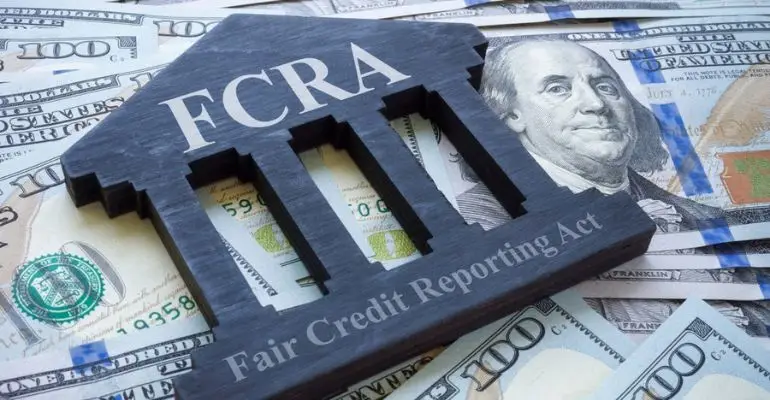What Is the Fair Credit Reporting Act?

When making a hiring decision, it’s standard practice for employers to consider the information they’ve received from an employee background check. The information in these reports can be quite sensitive, and under the Fair Credit Reporting Act (15 U.S.C. § 1681) (“FCRA”), employers are required to adhere to stringent employee notification rules to comply with the act. For employees and job seekers, it’s important that they know their rights under the FCRA in case they feel that they were denied a job, disciplined, or even fired due to the information found in these reports.
The FCRA and Consumer Reporting Agencies
The FCRA is a federal law enforced by the Federal Trade Commission and the Consumer Financial Protection Bureau. It was originally passed in 1970 (and expanded in 1996 to include other reports, including background checks) to “protect consumers [and employees] from the willful and/or negligent inclusion of inaccurate information in their credit reports.” In addition, it was designed to encourage the accuracy, fairness, and privacy of consumer (and employee) information.
The FCRA regulates consumer reporting agencies (CRAs), which collect and provide information about consumers, those who use consumer reports (for example, employers), and those who furnish consumer information (for example, debt collectors). This information is not just used for credit evaluation but also for checking on a criminal background to help employers make employment decisions.
This information is shared by CRAs in credit reports or consumer reports as they are sometimes known. These reports typically include:
- the amount of credit you have and have available,
- how much credit you’re using,
- whether you make your payments on time, and
- whether a bill collector is collecting on money you owe
In addition, credit reports may also contain rent payment information, if you are a renter and public records that detail your financial obligations and status, such as bankruptcies.
Beyond financial information, background checks can also include information on your driving record, employment history, criminal record, drug test results, and other documents that detail your history. Like credit reports, background checks are also regulated by the FCRA and are considered a consumer report. Employers use criminal background checks to evaluate whether a job applicant’s or employee’s past arrest or criminal record will have a bearing on the job they’ve applied for.
Fair Credit Reporting Act Compliance
Compliance with the Fair Credit Reporting Act is the responsibility of both the employer and the CRA that carries out the screening. Under the FCRA, employers must do the following if they choose to utilize a CRA to generate background checks to screen employees or job applicants:
-
- Obtain your written permission to perform the background check using an authorization form which meets the strict requirements of the Act.
- Provide a written disclosure for how they want to use your credit report, which includes a release of liability.
- Not misuse your information. For example, employers can only use your information for employment purposes, including appointments, hiring, promotion, retention, or transfers.
- Provide you with a copy of the credit report they are using as a basis for their decision, a Pre-Adverse Action Notice and Summary of Rights if they fire you or decide not to hire you based on the background report.
- Give you the chance to dispute the information in your credit report before they make a final adverse decision. This is referred to as the “pre-adverse notice” under the FCRA, and employees are given a reasonable amount of time to contest the report (typically five business days) before they receive an “adverse action notice.”
Employee Rights Under the Fair Credit Reporting Act
With the exception of some restrictions tied to medical and genetic information, it’s not illegal for employers to ask questions regarding a job applicant’s or employee’s background or to conduct a background check. However, if an employer uses this information as part of an employment decision, they must act in accordance with federal laws that protect job applicants and employees from discrimination. Consequently, if you are a job applicant or employee, you are granted the following rights under the FCRA when you receive an adverse action notice:
-
-
- You must be notified if the information in your file has been used against you (and given the name, address, and phone number of the agency that provided the information).
- You have a right to know what’s in your file.
- You have a right to dispute incomplete or inaccurate information (and the agency must investigate the information, if you report it to them).
- You may seek damages from those who violate the FCRA.
- CRAs must correct or delete inaccurate, incomplete, or unverifiable information (typically within 30 days).
- You have the right to ask for your credit score.
-
Why You May Need Legal Representation
In recent years, employers have increasingly violated the FCRA (for example, there were 416 lawsuits filed in January 2017 alone), particularly due to failure to obtain employee consent, not utilizing a legal form for consent, not engaging in the adverse decision process, and for using outdated notice forms.
In fact, in 2014, a class action lawsuit was filed in Florida against three national employers—Panera, AMC, and Nine West Holdings—that failed to obtain valid background check consent from job applicants during the online application process.
In addition, a Florida man recently brought a class-action lawsuit against UPS for not providing the results of background checks to job applicants, and another was filed against Whole Foods for performing illegal background checks on job applicants and employees.
If you feel as though your rights have been violated under the terms of the FCRA, you should consider contacting an experienced employment law attorney. It’s against the law to be fired, retaliated against, or not hired because an employer did not comply with the guidelines established by the FCRA. If a violation did occur, you may be able to recover actual or statutory damages, attorney’s fee, court costs, and punitive damages, if it was a willful violation.
Under the statute of limitations, FCRA lawsuits have to be filed within two years of the plaintiff discovering a violation or five years after the violation occurred.
Employers are required to be FCRA compliant, and there are also a number of Florida statutes that protect employees and job applicants. We at Wenzel Fenton Cabassa, P.A., can answer all of your questions regarding employee and applicant rights. Contact us today for your free case evaluation.
Other FCRA and workplace retaliation articles:
Please Note: At the time this article was written, the information contained within it was current based on the prevailing law at the time. Laws and precedents are subject to change, so this information may not be up to date. Always speak with a law firm regarding any legal situation to get the most current information available.
Related Posts
Recent Posts
- False Claims Act Retaliation & Your Rights
- Fired for Being Pregnant? 5 Situations When You Should Call an Employment Lawyer
- Can My Boss Take My Tips? The Laws of Tip Ownership
- What Does “Meets FCRA Requirements” Mean?
- Can Your Employer Contact You While on Medical Leave? Know Your FMLA Rights in Florida
Contact Us

FREE HELP GUIDES
Dealing with unpaid wages, discrimination or wrongful termination? Get the information you need to protect your workplace rights. We offer employment law resources to help you fight for workplace justice.




